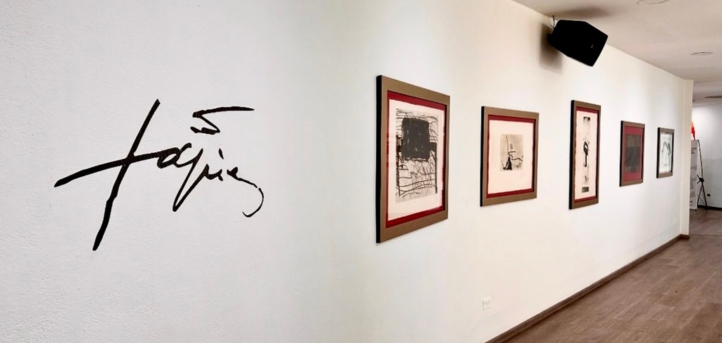he Cultural Work of FUNIBER and the European University of the Atlantic (UNEATLANTICO), in collaboration with the Embassy of Spain in Honduras, the Cultural Center of Spain in Tegucigalpa (CCET) and the Secretariat of Cultures, Arts and Patrimony of the Peoples of Honduras (SECAPPH), inaugurates the exhibition “Tàpies, collection of the engraver Barbarà” in the rooms of the CCET in Tegucigalpa (Honduras) .
he opening event was held on June 14 and was attended by Mr. Baltazar Fernandez, second in command of the Spanish Embassy in Tegucigalpa, Dr. Annarella Velez, Minister of SECAPPH, and Gabriela Quijano, Executive Director of FUNIBER Honduras.
he exhibition “Tàpies, collection of the engraver Barbarà” presents a sample of 29 engravings belonging to the collection of the outstanding engraver Barbarà, whose common denominator is the renowned painter and engraver from Barcelona Joan Barbarà (1927 – 2013) and one of the most outstanding Spanish artists of the 20th century, Antoni Tàpies (1923-2012).
ccording to Federico Fernández, dean of the Faculty of Social Sciences and Humanities of UNEATLANTICO and director of the Cultural Work of FUNIBER and UNEATLANTICO, the importance of this exhibition “lies in its singularity” and the works cover a wide stylistic repertoire of the author, “being able to appreciate several of his creative phases”.
Each of the pieces that make up this exhibition is the number zero of each work, the sample that the engraver kept and that has annotations in pencil by Tàpies”, comments Fernández, who points out that the bon à tirer are pieces that the artist considers perfect and that are used as a model for the print runs, which must be as close as possible to his quality.
he exhibition can be visited until July 27 from Tuesday to Saturday from 10:00 to 20:00 hours, free of charge. his event coincides with the celebration of the centenary of Tàpies’ birth. The objectives of this event, promoted by the Fundació Antoni Tàpies, are to approach in depth the work and thought of the artist, to disseminate them both nationally and internationally, to contribute to update the readings and to build new views.


